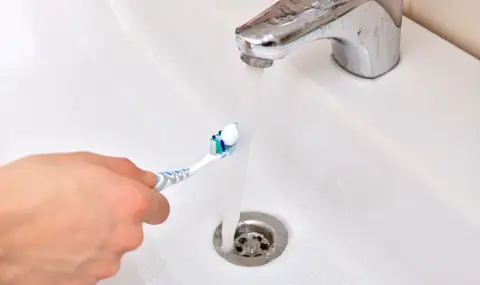Robert Kennedy Jr., nephew of assassinated US President John F. Kennedy, is a Trump supporter, an anti-vaxxer and possibly the next US Secretary of Health, who already has his own plans in this regard.
In his post on the social network, H Kennedy announced that the fluoridation of drinking water in the US will be stopped from the day Trump is sworn in. He claimed that fluoride was an industrial waste that caused a host of diseases, including bone cancer, neurodevelopmental disorders and lower IQ in children.
On January 20, the Trump White House will advise all U.S. water systems to remove fluoride from public water. Fluoride is an industrial waste associated with arthritis, bone fractures, bone cancer, IQ loss, neurodevelopmental disorders, and thyroid disease. President…
— Robert F. Kennedy Jr (@RobertKennedyJr) November 2, 2024
What is fluoride and where is it found?
Fluoride is often confused with fluorine - at least in everyday language. Fluorine is a highly toxic gas with a pungent odor. When reacted with water, hydrofluoric acid is obtained. Fluorides are salts of hydrofluoric acid. They occur in the form of many minerals in nature and also in the human body - mainly in bones and tooth enamel, but also in blood and gastric juice.
Natural sources of fluoride are black and green tea, fish and asparagus. In Germany, fluoride is added to toothpaste and table salt. In other countries, including the United States, drinking water is fluoridated.
Why is fluoride added to drinking water?
Fluoride is contained in a natural form in water, but in very small quantities. In the early 20th century, scientists noticed that higher levels of natural fluoride in some areas of the United States led to fewer cases of tooth decay in children. So fluoride began to be added to drinking water in other parts of the country, which has been a common practice ever since.
„A certain amount of fluoride is useful for keeping the teeth in good shape,” says toxicologist Carsten Schlee. Fluorides serve to remineralize tooth enamel and thus reduce the risk of caries.
Fluoride is currently used worldwide in toothpaste, salt and drinking water as a cost-effective caries prevention agent and has been named by the US CDC as one of the ten greatest health breakthroughs of the 20th century.
>
But not everyone seems to think so, as Kennedy Jr.'s post shows. In certain circles, fluoride has been criticized for years as a poison that is said to be the cause of many diseases.
Can fluoride be dangerous to health?
According to toxicologist Schlee, fluoride initially got a bad reputation, but it was completely unjustified. “In this case, the rule applies: everything depends on the dose. However, overdosing on toothpaste is practically impossible – mainly because toothpaste is usually not swallowed.
The situation is different with fluoridated drinking water or table salt. According to the CDC, one liter of drinking water contains 0.7 mg of fluoride. According to the German Institute for Consumer Health Protection (BgVV), this corresponds to the recommended daily intake for a young child between the ages of one and four.
The institute recommends that adults consume no more than 3.8 mg of fluoride per day. Overdosing can cause white spots on children's teeth, known as fluorosis. Even higher fluoride intake can cause teeth to become brown.
Long-term overdose of 10-25 mg per day can lead to skeletal fluorosis, bone fractures and joint changes. An extremely high fluoride intake of 300 to 600 mg per day can cause kidney damage.
Does fluoride make kids dumber?
In a 2023 meta-analysis. examines whether fluoride in drinking water harms brain development. However, the results of the conducted studies are different. One meta-analysis, for example, indicated that if IQ decreased at all, it was only when fluoride intake was above recommended levels. However, based on the available data, it is not possible to definitively judge whether or not fluoride causes any form of neurological disorder.
Carsten Schlee believes that if fluoride disappears from Americans' water starting January 20, it will not lead to a decline in neurological diseases. But there will likely be more children and adults with tooth decay.
Author: Julia Vergin
